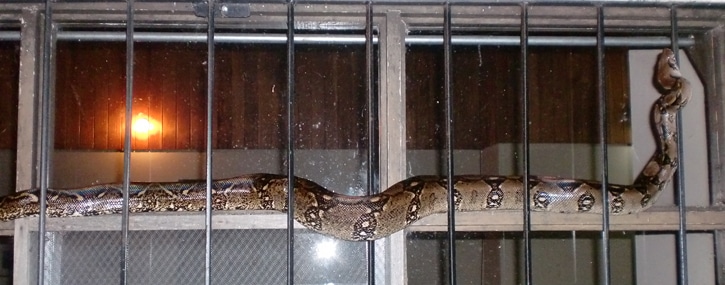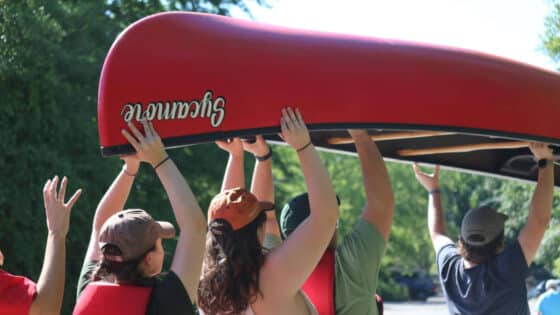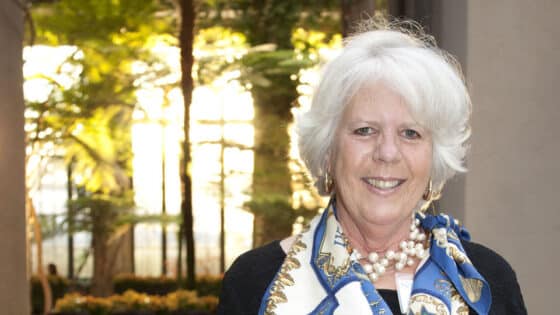By Jamie Blaine
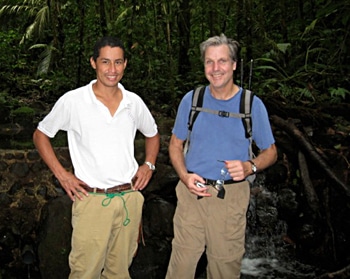
When Bern Sweeney describes Rafa Morales, the job he does and the responsibilities he has for the Maritza Biological Station in Costa Rica, it reminds me of . . . well, Bern Sweeney.
“I have never put a challenge in front of Rafa that has made him pause,” said Sweeney.
Twenty-two years ago, Rafa was one of seven unskilled young men who had been hired to collect stream macroinvertebrates under a three-year National Science Foundation (NSF) grant. He did not have a high school diploma, he had no scientific background, and his previous job had been working in a hardware store in the tiny town of La Cruz. Less than a year later, he was in charge of the station itself and, under the guidance of Stroud Water Research Center scientists, the research project as well.
How did that happen?
“We were in the middle of an NSF grant,” said Sweeney, “and I needed someone quickly. Rafa stood out from the beginning, both in the quality of his work and the way he carried himself. He is a leader.”

How did it work out?
“He is the greatest employee you could possibly have.”
Hyperbole?
“He has grabbed virtually every opportunity we have thrown his way,” said Senior Research Scientist John Jackson, who has spent more time with Rafa than any other senior staff member, “and he has never said, ‘I can’t do that.’ He says, ‘Show me the way.’
“It is often sink or swim down there,” said Jackson, “and Rafa doesn’t sink.”
Those who know Morales best describe him with words that are often identical: Intelligent. Conscientious. Responsible. Curious. Honest. Funny.
“He has a propensity to remember everything that happens to you — like getting stuck on the road — and reminding you every time you visit,” said Steve Stroud, a Center director and Costa Rican resident. “Fortunately for those of us he has targeted, things sometimes happen to him, too. But he laughs just as hard at himself.
In fact, photos give a good indication of the breadth of Rafa’s work . . .

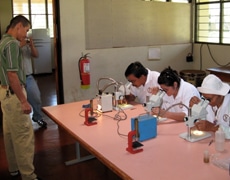

But it is the way he manages the station, the dignity with which he treats visitors, and the care he takes of both equipment and the landscape that bring the highest praise.
“Everything he touches — the lab, the trails, the equipment, the vehicles,” said Sweeney, “is spotless and well-maintained.”
Adds Jackson, “His wife, Marietta, once told me, ‘I thought the red Toyota was his girlfriend, he took such good care of it.’”
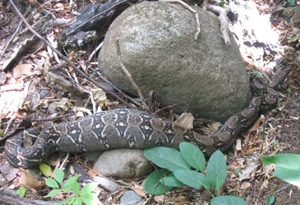
Despite all the hours he spends working, Morales went back to high school to get his degree, and he has taught himself English, although he remains embarrassed about his grammar. He and Marietta have sent their two daughters, Marisara and Caroline, to a bilingual private school, and both will get their college degrees. He is very proud of them.
And he is proud of his work and excited by the opportunities it has given him. “The station is like a big open library where I have come to know a new world in the canyons,” he said. “It is a job that teaches me there is no barrier to learning and that every day you can learn something new.”
Although he is not a trained scientist, said Jackson, “he is an old-style naturalist, as a farmer or a rancher is a naturalist.”
“He is curious about natural science, has an incredible memory, and he knows the landscape intimately,” said Sweeney. “Tell Rafa what you need . . . and then stay behind him.”
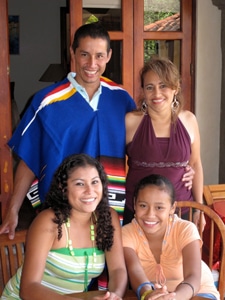
The Maritza Station lies at the foot of the towering Orosí volcano, its only entrance a long and rocky road, which is constantly eroded by torrential summer rains. It is a distant and beautiful place, and it is not easy to get to, as it can take an hour or more just to travel in from the highway by jeep . . . and there are no guarantees you will make it. So Marietta and their daughters must live primarily in La Cruz, although Rafa brings them to Maritza as much as he can, and Marietta will come up and cook for visitors.
“The station is my second home,” said Rafa with pride. “I am here so much, and I have seen our daughters grow here.”
And it is a home he makes open and welcoming for visitors.
“It’s a unique place for us,” said Jackson. “Because Rafa spends so much time at Maritza, he basically lets us into his family life.”
Despite its remoteness, Rafa has made Maritza a center for tropical water research and education in Costa Rica and a welcoming place for both local and foreign visitors.
Some visitors, however, must stay outside.
